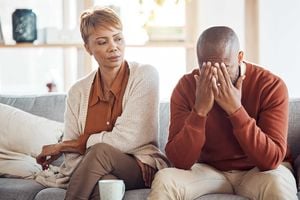
From left: Florence Wanjala, Jecolliah Mogoko and Dr Stella Njenga.
The lifecycle of a woman is marked by huge transitions, each carrying its unique set of challenges and triumphs. From the onset of menstruation, often shrouded in secrecy and shame in the past, to the transformative experiences of childbirth, and finally, the physical and emotional shifts of menopause, a woman's journey is anything but linear.
Different women have different experiences. Yet, through these stages, women display remarkable resilience, navigating the complexities with grace and strength. Nation Lifestyle spoke to three women who have traversed these milestones and they shed light on the personal battles they have fought and how societal perceptions have evolved.
Menstruation
Over the years menstruation has evolved, from a time when it was looked upon with shame to today, when it is seen as a natural aspect of a woman. Florence Liambila Wanjala, 58, an administration manager at Nairobi City Water and Sewerage Company, was born and raised in an age when menstruation was not spoken about, and if it was, it had to be in whispers. At that time, periods were viewed not as a natural occurrence for women but as a source of shame.
“I navigated my menstruation period all by myself, with no guidance. No one told me, “As you are growing up, this is how your body is going to behave or change. Some things were unheard of. You could not just sit with your mum and discuss such things.
Before my periods started, my body changed. I had acne all over my face. My breasts started developing, and I started becoming more conscious about my appearance. I became more shy and had difficulty relating to people. I used to think that people were looking at me and wondering what was happening to my body.
Then, one morning, I woke up and I had wet my bed, not with urine but period blood. I felt very embarrassed. I looked around to see if anybody had seen my mess and quickly took care of it,” recalls Mrs Wanjala, who started her periods when she was 15.
“I come from a very humble background. What helped me get pads was that upon joining high school, it was mandatory for parents to buy their children sanitary towels whether they had started menstruating or not.
However, using the pads was also a challenge because I hadn’t been taught how to put them on. Also, the panties I had were not fitting well, so I walked around with the fear of staining my clothes,” says Florence, who was born and raised in Bungoma County.
For Florence, there was no one to speak to, as menstruation was not part of normal girl talk. You spoke about it only in hushed tones. She says discussions about buying sanitary pads could only be held with her mother. Her father was never involved in any way.
“It was something that you were expected to keep a secret. All I knew was that girls got periods every month from Biology classes. I didn’t know anything else. It was like being thrown into the ocean, and you have to learn how to swim.”
When Jecolliah Mogoko started her period, her experience was almost blissful, save for the period cramps. She was in boarding school at the time.
“I remember I was in Class Eight. I had an easy experience, and I was in a very nice school. We were privileged to have enough pads at our disposal and our matron was also very motherly. It was also a time when many of us were having our periods, so we would talk about it a lot.
I also have older sisters, so I knew about periods even before mine started. I had already learnt about it. I knew what to buy, and how to put on the pads,” she says.

Jecolliah Mogoko during the interview on July 24, 2024 at Nation Centre in Nairobi.
Her toughest experience with menstruation had been the period cramps.
“I got very painful stomach cramps when my periods started. I remember they used to be so bad that I would even lie on the floor, take medication and sometimes pain injections. I would also feel very nauseous during my periods,” the 24-year-old tells us.
To deal with the cramps, Ms Jecolliah now uses herbal remedies like arorwet and painkillers.
She is glad that the shame around periods and pads is coming to an end, and that people are more educated and understanding.
“Right now, I can comfortably send my brother or my boyfriend for pads or tampons,” she says, adding, “I had once gone for a job interview, and I had donned a white dress. We sat the whole time, and when I got up, I had a big stain on my dress. I went and cried my heart out in the washrooms. Then I spoke to one of the interviewers and he was very courteous and even requested a female colleague to help me out.”
Dr Stella Njenga, an obstetrician-gynaecologist at AIC Kijabe Hospital, says, “For many girls, puberty starts at around age nine, although with the change in environment and child obesity, we are seeing puberty starting even in girls as young as eight. Menses come as the last stage of puberty.”
Dr Njenga says that the time when you start your period is genetically predetermined.
“You’ll find that your daughter will start her periods at around the same time that you started your periods and also get to menopause at almost the same time as you,” she says.
On period pain, commonly referred to as dysmenorrhea, Dr Njenga says that there is primary and secondary dysmenorrhea.
“Primary dysmenorrhea is where you are having a lot of pain during your menstruation, and there is no explanation for the pain. Most young girls will have primary dysmenorrhea. There is some degree of period pain that is normal because when your uterus contracts, you will feel a bit of pain. Secondary dysmenorrhea is where we have found that something is causing the pain. For some, the pain may be caused by endometriosis. Endometriosis is where the cells inside the uterus are found in other places like on the fallopian tube, ovaries, chest, teeth, lungs, and even behind the uterus. You will then find someone bleeding from the chest, gums, teeth or eyes during their menstruation period. As your body knows, this is not normal. Your immune system normally attacks the cells, hence the pain. Endometriosis is getting more common. Older people mostly deal with fibroids and adenomyosis,” she says.

Obstetric gynaecologist at AIC Kijabe Hospital, Dr Stella Njenga on July 11, 2024 at Kijabe Hospital.
Childbirth
The birth of a child is often a big highlight in any woman’s life. This is the time when she gets to bring forth life.
Dr Stella says that when that time came, she did not have a very difficult time.
“My experience was not very bad. I only struggled with heartburn and change in taste,” the mother of three shares. “All my children were delivered through cesarean section.
My first baby was in breach position, so I had to get a C-section birth, but after that, I chose to have my other two children the same way,” she says, advising that, “If you only have one cesarean delivery, then you can have all your other children through normal vaginal delivery.”
Dr Njenga, 38, says that women can get medication for many pregnancy symptoms, but that won’t help much.
“The pregnancy hormones are with you until you deliver. The interesting bit is that after you deliver your baby, everything goes back to normal.”
Florence got pregnant while she was a first-year university student at the University of Nairobi.
“I moved in to live with my now spouse. At that time, I was rebelling. I did not even want my parents at home to know that I was expectant and living with a man.”
With no one to speak to, Ms Wanjala found herself navigating the pregnancy period by herself.
“Four to five months after I found out that I was pregnant, I took myself to the clinic. I thought that was something I was supposed to do as an upcoming mother. I started attending clinics where they guided and helped me with my blood pressure. I gave birth through C-section as there were complications. Afterwards, the nurses helped me to figure out how to deal with the heavy bleeding that followed, and caring for the baby,” she says.

Administration Manager at Nairobi City Water and Sewerage Company, Florence Wanjala during an interview on July 24, 2024 at National Water Plaza.
Menopause
Perimenopause is the transition period before menopause. Dr Njenga says, “Some people go into menopause earlier, with the average age being between 53 and 55 years. From age 45 onwards you are in perimenopause. In the last two years, before your periods end, you will have irregular periods. We define menopause as one full year without periods.”
For Ms Wanjala, her perimenopause experience started when she was 48 years old.
“I started having very painful cramps whenever my menses would come. It was not just the normal pains, so I decided to see a gynaecologist, and I was told that I was developing fibroids. The doctor scheduled me for surgery to remove the fibroids and the womb.
However, I was hesitant to undergo the surgery. I had friends who had gone for minor surgeries and never woke up, so I declined.
With time, things became more bearable. The periods became a bit irregular and less painful after two or three months. That went on until they disappeared. But, the end of my menses did not come comfortably. I developed hot flashes that came as an attack and then ended.
I also found myself struggling with forgetfulness and being unnecessarily irritable. Recently, my grandchildren asked me whether I was stressed because I was shouting a lot. It is a natural process that I had not anticipated,” she says.
The upside of this, Ms Wanjala says, is that she now finds herself craving healthy food.
“Before, I would indulge in chips and soda, but now I find myself preferring arrowroots, traditional greens, smoothies and fruits.” She also takes calcium supplements. Following her gynecologist’s advice, she goes for a pap smear every year. Daily exercises help her deal with the menopausal effects.
“I do rope skipping, walking around and other exercises that I am comfortable with.
In dealing with menopause, Dr Njenga says, “Doctors treat the particular issue affecting the woman. So, if it is hot flashes, we have hormone replacement therapy. Hormonal replacement therapy is where we give you oestrogen. Oestrogen has some side effects, so for someone with an intact womb, we prescribe it together with progesterone.
Oestrogen alone keeps you at risk of getting cancer or cardiovascular conditions such as blood clots and strokes. Progesterone helps to counter the effects of oestrogen.”
The medication will not be taken forever. Dr Stella says it is often prescribed for five years.
When she looks back, Ms Wanjala wishes that there was more open talk about the experiences of a woman and what to expect in the different stages of life.
“I wish I knew that with menopause, there would be other body changes, not just the stopping of menstrual blood. I would have been prepared psychologically. Menopause is not a death sentence or a curse. I wish there were more support groups for women undergoing menopause.”







